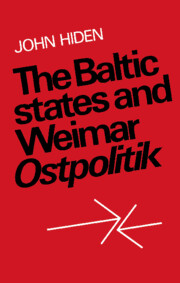Book contents
- Frontmatter
- Contents
- Introduction
- PART I THE POLITICS OF PEACEMAKING 1919–20
- PART II TRADE AND FOREIGN POLICY 1921–3
- 3 The springboard concept
- 4 The politics of provisional trade treaties
- PART III WEIMAR REVISIONISM AND BALTIC SECURITY 1923–33
- CONCLUSIONS
- Map
- Tables
- Abbreviations
- Notes
- Bibliography
- Index
3 - The springboard concept
Published online by Cambridge University Press: 22 September 2009
- Frontmatter
- Contents
- Introduction
- PART I THE POLITICS OF PEACEMAKING 1919–20
- PART II TRADE AND FOREIGN POLICY 1921–3
- 3 The springboard concept
- 4 The politics of provisional trade treaties
- PART III WEIMAR REVISIONISM AND BALTIC SECURITY 1923–33
- CONCLUSIONS
- Map
- Tables
- Abbreviations
- Notes
- Bibliography
- Index
Summary
‘The Germans are divided financially into two camps: the businessmen on the Rhine whose factories are working (thanks to the occupation) are largely looking westwards. The rest of Germany is looking East.’ This appreciation by the British Foreign Office neglected to point out that the view in question was being watched with equal interest by the rest of Europe. In the present climate of East–West uneasiness it comes as something of a shock to record the veritable clamour for business with Russia which developed in Europe after 1918 and to chart the inflated expectations attached to this commerce. The prospect of competition in this area was a deadly serious one for post-Versailles Germany. As with the Auslandsdeutsche, so with its foreign trade the Weimar Republic sought to exploit what resources it had to offset its international weakness after 1919. General Groener might well lament in May 1919 that a foreign policy needed ‘power, an army, a fleet and money, all of which we no longer have’. Others were more aware of the leverage to be gained by an active trade policy, above all in East Europe. Stresemann put the matter succinctly later by writing: ‘Now that we no longer have our army there are only two sources of German power. One is our united national will and feeling. The second is the German economy … Our economy is the most powerful source of potential today … in the last resort every German government must cooperate with the German economy.’ Doubtless, Foreign Minister Friedrich Rosen had such considerations in mind when he said of Germany after 1919 that ‘economics alone were decisive and foreign policy as such pointless’.
- Type
- Chapter
- Information
- The Baltic States and Weimar Ostpolitik , pp. 63 - 92Publisher: Cambridge University PressPrint publication year: 1987



